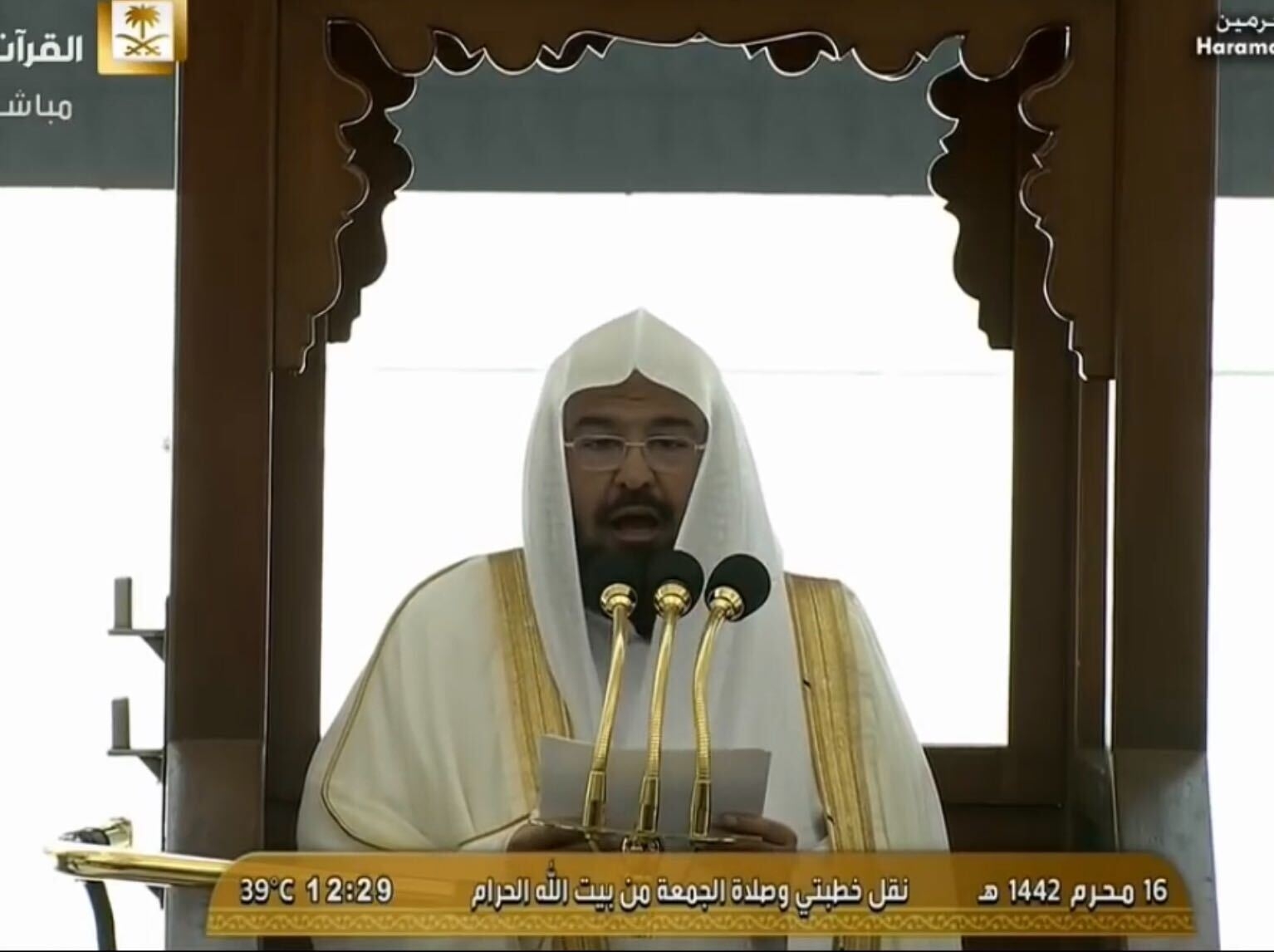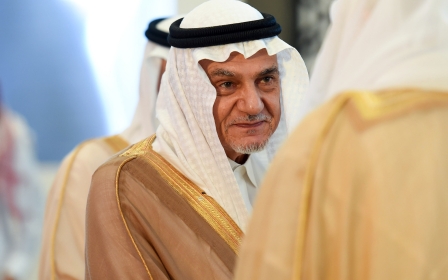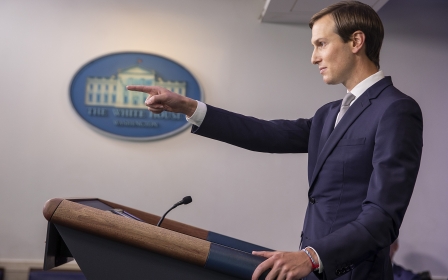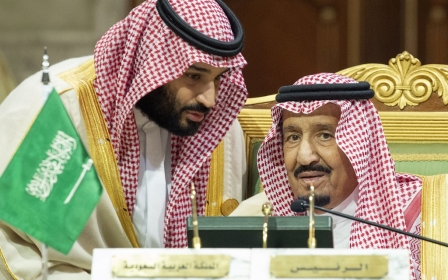Mecca sermon raises questions on possible Saudi normalisation with Israel

A sermon by Abdulrahman al-Sudais, the imam of the Grand Mosque of Mecca, has caused a stir on social media after it was interpreted by some as a prelude to Saudi normalisation with Israel.
Sudais delivered a Friday sermon in which he preached dialogue and kindness to non-Muslims, making specific reference to Jews.
The comments came less than four weeks after the United Arab Emirates and Israel announced plans to normalise diplomatic ties, amid speculation regarding whether Saudi Arabia would follow suit.
The imam urged worshippers to avoid "any misconceptions about correct beliefs in the heart coexisting with having healthy dealings in interpersonal exchanges and international relations".
He went on to mention several stories from the Prophet Muhammad's life in which he maintained good relations with non-Muslims.
New MEE newsletter: Jerusalem Dispatch
Sign up to get the latest insights and analysis on Israel-Palestine, alongside Turkey Unpacked and other MEE newsletters
These included the prophet performing wudhu (ablution) from the bottle of a non-Muslim woman, forging a peace agreement with the Jewish inhabitants of the Khaybar region and dealing so well with a Jewish neighbour that he eventually converted to Islam.
"When the course of healthy human dialogue is neglected, parts of people's civilisations will collide, and the language that will become prevalent is one of violence, exclusion and hatred," Sudais said.
He went on to stress the importance of remaining obedient towards leaders and authorities, and to be aware of "misguided factions and groups".
The remarks met with criticism on social media, with many users accusing Sudais of misusing the platform of Islam's holiest mosque.
Translation: Abdulrahman al-Sudais delivers a Friday sermon today in the Noble Sanctuary to prepare for the Saudi-Israeli normalisation. Al Saud always repeated: keep the Hajj and the Two Holy Mosques out of politics. But if they had a need, they made the pulpits of the Two Holy Mosques dedicated to it.
Translation: Al-Sudais exploiting the al-Haram al-Sharif forum to promote normalisation and to call for obedience to murderous rulers is new evidence that the future of Islam is in danger if the two sacred places continue to be in the hands of ungodly rulers and priests without conscience.
Sudais also used his sermon to discuss the status of the Al-Asqa Mosque in Jerusalem, which he said had been "taken prisoner".
"This is an issue that is of utmost priority to the people of Islam and it must not be forgotten amid new struggles that appear," he told worshippers. "It must be kept in mind, but without exaggerations in the media or battles on the internet."
The normalisation deal between Israel and the UAE has raised concerns about the sensitive status of Al-Aqsa, the third-holiest site in Islam.
A report last week suggested that the ambiguous wording of a joint statement by the United States, Israel and the UAE was an intentional attempt to open up the Al-Aqsa compound for Jewish prayer and ultimately change the status quo.
While Jews are at present allowed to access the site, they are not allowed to pray there as per an agreement between Israel and Jordan, the official custodian of Christian and Muslim holy sites in Jerusalem.
At the end of his sermon, Sudais prayed to God to "rescue Al-Aqsa mosque from the clutches of the aggressors" and allow it to be "a revered location until the day of reckoning".
His stance was seen as contradictory by social media users, many of whom accused him of betraying the Palestinian cause.
Translation: The contradictions of Al-Sudais from the captive occupation:
- Calls God to save Al-Aqsa Mosque from the abomination of the aggressors, and to support the people of Gaza and grant them empowerment, and weep over the martyrdom of Ahmed Yassin.
- Justifies normalisation and dealing with Israel, citing prophetic narratives whose historical context does not match the current reality
Translation: Al-Sudais, in his sermon on the importance of normalisation, proved to us that the shoes of Palestinian children may be cleaner than some beards...
This was not the first time that Sudais had caused controversy.
In 2017, he was criticised for claiming in a TV interview that US President Donald Trump, the US and Saudi Arabia were "steering the world to peace".
He was also heckled during a talk he gave at a mosque in Geneva in 2018, where he was asked by an audience member: "How can you lecture us about peace while you boycott and starve your brothers in Yemen and Qatar?"
Saudi Arabia does not have official diplomatic relations with Israel, but Gulf Arab nations have had increasingly public ties with Israel in recent years, boosted by their shared rivalry with Iran and the advantages of linking their economies.
Middle East Eye previously revealed that Saudi Arabia's Crown Prince Mohammed bin Salman had pulled out of a planned visit to Washington DC to meet Israeli Prime Minister Benjamin Netanyahu, after he feared that the news had leaked and that his own presence in the US capital would become a "nightmare".
Sources told MEE that Trump and his son-in-law and adviser Jared Kushner had been pushing for the meeting to happen in order to relaunch bin Salman's image as a young Arab peacemaker and shore up regional support for the deal between Israel and the UAE.
However, bin Salman’s father, King Salman, has maintained the stance that any peace agreement with Israel was contingent on a deal between Israel and the Palestinian leadership establishing a Palestinian state.
This article is available in French on Middle East Eye French edition.
Middle East Eye delivers independent and unrivalled coverage and analysis of the Middle East, North Africa and beyond. To learn more about republishing this content and the associated fees, please fill out this form. More about MEE can be found here.




